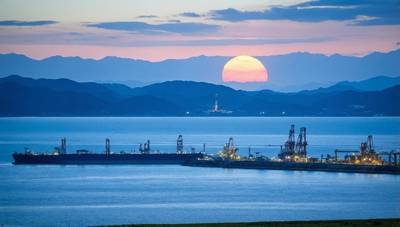Japan returns to long term LNG deals on AI boom and national energy plan
The liquefied gas industry in Japan is once again in the spotlight, as artificial intelligence booms and rising costs of cleaner energy drive the appetite for long-term LNG contracts.
Japan, which is the second largest LNG importer in the world, has secured long-term deals with Qatar, and other buyers are also securing such agreements.
Japan's LNG exports have been falling for over a decade, as the nuclear power plants that were idled following the Fukushima catastrophe began to operate again and renewable energy sources increased.
The AI boom will require enormous power consumption from data centres. Japan's 7th Strategic Energy Plan, released in February, identified gas as an important source of energy even after the country achieves its goal of zero carbon emissions by the year 2050.
Yukio KANI, CEO of JERA (Japan's largest power generator and LNG purchaser), said that the data centre boom is changing the curve. "Japan needs LNG if we want to find quick solutions for data centers." This is an external change."
Kani stated that the rising costs of alternative fuels such as hydrogen and ammonia have also dimmed the prospects for these fuels.
He said, "We expected ammonia to develop faster two or three year ago, but we now have to take a pause." "So, we have been switching back to LNG in the last year or two."
STILL IN THE MIX
According to the Japanese energy plan, if Japan meets its target of reducing emissions, it is expected that annual LNG demand will fall from 66 millions tons last year to 53-61 million tons by 2040. In a scenario with lagging decarbonisation technology, METI predicted that demand would rise to 74 millions tons.
Amid price volatility and the risk of supply disruption, the plan calls for public/private cooperation in order to secure long-term fuel contracts. Under Japan's previous decarbonisation-focussed energy plan, gas importers had hesitated to sign long-term contracts.
Takashi Uchida is the chairman of Japan Gas Association, and Tokyo Gas, which is a top city gas supplier.
Lachlan Clancy, a partner in Herbert Smith Freehills Kramer's energy department, said: "It is very clear that LNG can play a significant role as a fuel for transition, and now it's firmly included in this investment cycle."
According to the Organization for Cross-regional Coordination of Transmission Operators in Japan, Japan has also auctioned new gas-fired capacity to replace coal power plants. In the last two years, 7 gigawatts were awarded.
The organisation predicted that the capacity of LNG-fired power plants would increase to 85.75GW by 2034, from 79.98GW in 2024.
According to Japan's Energy Plan, power generation is expected to increase between 12% and 22 % from levels in 2023 up until between 1,100 and 1200 terawatt hours by 2040. The International Energy Agency predicts that Japan's data centers will consume 80% more energy, or 15 TWh by 2030.
Morgan Stanley predicts that Japan's imports of LNG will reach 78 million tonnes in 2030, as the gas-fired generation of electricity increases amid rising costs for solar and wind energy.
'UNCERTAINTY AHEAD'
Since METI's energy plan was released, Osaka Gas has signed a 15 year pact, Kyushu Electric Power announced that it would be signing a long-term contract with Energy Transfer. JERA also inked four deals of 20 years with U.S. companies NextDecade Infrastructure, Cheniere Marketing, and Commonwealth LNG.
From late 2022 until early this year, Japanese purchasers announced three contracts longer than 10 years.
Masanori Odaka, analyst at Rystad Energy, predicts that more deals will be made soon as utilities look to replace volumes expiring for supply security, and to meet seasonal demand.
Last month, it was reported that JERA and Mitsui & Co were in discussions for long-term supplies from QatarEnergy’s North Field Expansion Project.
There is still uncertainty about Japan's LNG demand, mainly because of its inability to meet its carbon neutrality goals and the pace at which it restarts nuclear plants.
Importers have increased their trading operations to address this issue and are now pursuing flexible contracts.
Tokyo Gas' Uchida said that, with the government providing multiple future scenarios it was no longer possible to give a definitive forecast for energy demand and supply. This highlights the uncertainty in the near future.
(source: Reuters)



